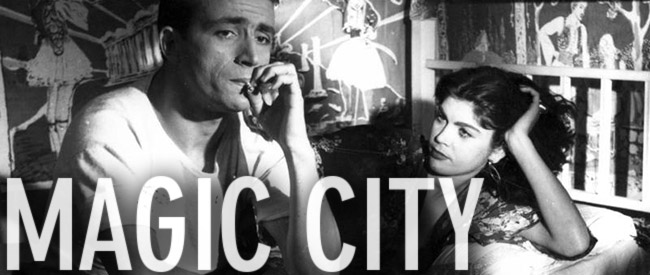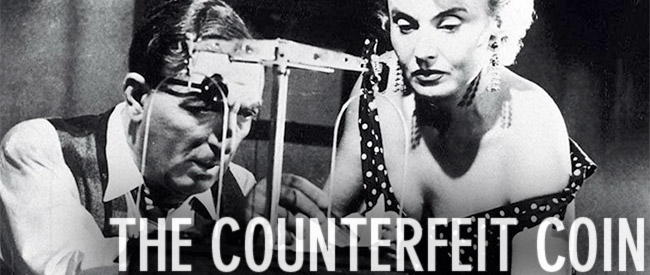This September we present three masterpieces of Greek cinema that emerged from a renewed industry amid a wellspring of creativity in the mid-1950s.
During World War II, with the Greek government in exile, a left-wing resistance emerged against occupation. Following the axis’s defeat, Greece was flung into further conflict as a civil war broke out within a polarized political landscape between the emboldened, yet increasingly disorganized, Communist party and an American- and British-backed right-wing government. As a result, the population of the countryside dwindled, reemerging as a working class in urban centers, bringing along with it a demand for mass entertainment. After the civil war concluded in 1949, the film industry began to grow, artists returned (including Nikos Koundouros, a young painter/sculptor and left-wing resistance fighter returning from exile on a prison island), and Greek cinema came into its own—producing three masterpieces in the years 1954 and 1955 that heralded a new maturity definitive national cinema.
MAGIC CITY
Dir. Nikos Koundouros, 1954.
Greece. 80 min.
In Greek with English subtitles.
SATURDAY, SEPTEMBER 6 – 7:30 PM
WEDNESDAY, SEPTEMBER 17 – 10:00 PM
THURSDAY, SEPTEMBER 25 – 10:00 PM
MAGIC CITY is the fantastic debut of Nikos Koundouros, one of Greece’s most iconoclastic postwar filmmakers. Blending Italian Neorealism with a personal stylistic sensibility that anticipates Jean-Pierre Melville’s gangster chic, MAGIC CITY stars Giorgos Foundas (also of STELLA) as Kosmas, a young man scraping by in the slums of Athens trying to make an honest living–while carrying on with a married woman and bumming around with hoods in the underground clubs and arcade alleys of “Magic City.” When the bank threatens to repossess his truck—source of his pride, a benefit to his community, and lifeblood of his labor—he reluctantly takes a smuggling gig in hopes of making his payments — but learns he’s in for a little more than he bargained for.
MAGIC CITY crafts a new urban poetic realism that champions the working poor while delving into modern issues of moral complexity. And it’s every bit a brilliant first film — exuberant, perhaps overly idealistic, and brimming with the discovery of a new national character in cinema. Nikos Koundouros went on to make O DRAKOS (aka THE FIEND OF ATHENS), which we showed back in Spring 2012.
STELLA
Dir. Michael Cacoyannis, 1955.
Greece. 91 min.
In Greek with English subtitles.
SUNDAY, SEPTEMBER 7 – 5:00 PM
SATURDAY, SEPTEMBER 13 – 7:30 PM
WEDNESDAY, SEPTEMBER 17 – 7:30 PM
WEDNESDAY, SEPTEMBER 24 – 7:30 PM
Stella is a bold, proud, resolutely independent woman–and every man she meets wants to possess her. As the most popular singer at a late-night bouzouki club, she meets Alekos, a mild-mannered middle-class kid who begrudgingly tries to accept that she won’t settle down. He asks whether there’s someone else, and she tells him that when there is, he’ll be the first to know. True to her word, she puts it to him straight when she becomes mutually enthralled with a reckless, domineering footballer, Miltos. In her own words, they enjoy life as “wild animals.” But when tragedy intervenes and Miltos tries to tie her down, Stella’s virtues of personal freedom are put to the test.
Few films from the 1950s are as risqué, funny, complex, or melancholy. One could imagine Stella picking Barbara Stanwyck and Rita Hayworth out of her teeth after breakfast. But she’s not so much the dubious “femme fatale” as a fearless woman who refuses to relent on the matter of her autonomy at any cost. It wouldn’t be a Greek drama without tragedy — but the film’s complex resolution seems to suggest Stella’s loss isn’t a result of internal failings, but a society incapable of producing someone who can live up to her. The story is rounded out by evocative urban-realist production that occasionally suggests the fantastic (particularly in its pitch-perfect opening credits), and legendary composer Manos Hatzidakis provides what some consider his best work.
Star Melina Mercouri was no less of a firebrand in real life. She became an outspoken critic of the state following the 1967 military junta, and when her citizenship was revoked, she famously stated, “I was born a Greek, and I will die a Greek. Mr. Pattakos [the Minister of the Interior] was born a fascist, and he will die a fascist.” She continued to speak out abroad even as she came under fire of assassination attempts. After the fall of the dictatorship in 1974, she co-founded the Panhellenic Socialist Movement and in 1977 was elected to parliament with the highest number of votes of any of the candidates in that election. In 1981 she became the first woman appointed to the position Minister of Culture for Greece, during which time she founded the European Capital of Culture program, a significant distinction that continues to play an important role in the socioeconomic development of European cities. STELLA, in which she provides the most iconic performance in Greek cinema, was shockingly her film debut.
If you only ever see one Greek film in your entire life, this should probably be it.
THE COUNTERFEIT COIN
Dir. George Tzavellas, 1955.
Greece. 118 min.
SUNDAY, SEPTEMBER 7 – 7:30 PM
THURSDAY, SEPTEMBER 25 – 7:30 PM
SUNDAY, SEPTEMBER 28 – 7:30 PM
A masterfully made Hellenic take on Max Ophuls’ LA RONDE, THE COUNTERFEIT COIN tells four stories linked by the title forgery as it passes from pocket-to-pocket in Athens. It begins with the story of the creator, a master engraver whose conned into spending his retirement funds on a counterfeiting lab. It eventually transfers through the hands of a con artist pretending to be a blind beggar, a young prostitute, a poor family, and a hopeful newlywed couple, creating a social panorama of modern Greece that is by turns funny, tragic, tear jerking, and inspiring.



